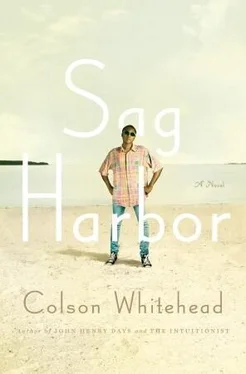If only they could see us now. O Pioneers!
Through the rusted hole in the backseat floor, I watched the asphalt blur. Randy warned us constantly to be careful around the snowflaked edges of the hole, so as not to make it worse. Every big bump in the road, bits of it fell away into the void. I nudged the rusted edge with my foot and saw it disintegrate and fly away. Up front, Randy started in with a story of last night's shift at the Long Wharf, the restaurant on the town pier. His work stories invariably revolved around tips, elaborate up-and-down melodramas full of defeats and sudden, triumphant reversals. “At first we thought it was going to be a slow night…” I remembered to ask NP about his job at Jonni Waffle.
“I like working there. The manager is cool,” NP said. “And sometimes they let you bring a pint home.”
“Can you get me an application?” I asked. I'd put it off, but I needed a job. I was out of money, we needed TV dinners for the next few days, and as it stood now Reggie was going to have to pay for them out of his Burger King paycheck. My mother would reimburse him when they came out, but I didn't relish having to beg soup money from him. So: fill out an application for Jonni Waffle and take it from there.
We rumbled across the wooden bridge over the railroad track, and traversed 27 after not too long a wait. Before July Fourth weekend, crossing Route 27 was a minor hassle. But after the Fourth, the crypts up-island disgorged their Hamptonite Undead in earnest, and you never knew how long you'd spend stranded, waiting for the caravan to thin. (Helpful Hint #236 for the Hamptonite Undead: sunscreen slows down the rate of decomposition by solar rays when you are riding around with the top down.) Then we were in Sagaponack, popping into the roadside deli for supplies, and a few minutes later we pulled up at Left Left, the beach down from the town beach. No permit needed, no lifeguards. And this year, no parents.
WE TRUDGED IN FORMATION UP THE DUNE, beach grass lashing our calves, entering that strange zone of black sand at the head of the beach. The black sand was twice as hot as the rest of the sand on the beach, inspiring cartoony cries of “Ow, ow, ow!” in former times, and a stoic teeth-gritting today. There weren't many people. We had our pick of spots.
“Let's go over there,” Randy said.
“Over here,” Clive countered, and we followed him to a spot above the tide line, demarcated by a garland of dried seaweed. Clive had always been the leader of our group. He was just cool, no joke. I pitied Marcus for his victimhood; I pitied Clive because he had to hang out with us. He was that rare thing among us: halfway normal, socialized and capable and charismatic. Like — he did sports. Basketball and track, captain of one of the teams at his school, I can't remember which, he was good at both of them. Sometimes he tried to get a basketball game together, two-on-two, but after a while we just started playing three against him, and he still won, leaving us a sorry sight at the side of the court, bent over and dizzy, palms on our knees and reaching for imaginary asthma inhalers. Imaginary asthma inhalers created a placebo effect, which was better than nothing.
Before Reggie and I had an Empty House, and thus the meeting place/departure point for expeditions, the one sure way not to be excluded from that day's adventures was to be the first one over at Clive's crib, where all the major decisions went down. Crack of dawn was a bit excessive, but the thinking went that you couldn't be ditched if you stuck close to Clive. Tall and muscular, he had the physical might to beat us up, but he broke up fights between us instead, separating combatants while dodging their whirling fists, and no one complained. A reluctant Solomon with a soul patch, he ended disputes over the important issues of the day, such as who called shotgun first, who had next on the diving board, who was up on Punch-Out, the video game in the lobby of the East Hampton movie theater that we worshipped like a pagan totem while the white people stared. He knew how to talk to girls, had girlfriends, plural. Good-looking girlfriends, too, from all accounts, with all their teeth and everything. Last summer he'd even dated an older woman — in her twenties! Who lived in Springs! Who had a kid! He had his problems like the rest of us but he hadn't let them deform his character yet. Not back then.
We picked our spots around camp, laying our towels down, weighing down their edges with sneakers and sodas to keep them from flipping up. And it happened, like that, after an increment of time so tiny that neutrons and protons were the only witnesses: we got sanded. In the towels, scalps, clumping on sweat along our limbs. It had begun, the gritification of the day. Some windy afternoons, the wind agitated the sand into a needling layer two inches thick. It hovered above the beach, the atmosphere of a different planet, saying, You should not be here. But what was another warning among so many?
We were the only black people on the beach. My sister's group was grown up, dispersed, and most of the moms from our neighborhood frequented the town beach, which had a lifeguard. “Stay within the markers!” There was a nice bit of suspense when you rounded the bend to the town beach and saw the flag — red, yellow, or white — signaling how rough the surf was that day. On red-flag days you heard the thunderous hammer of the waves before you got over the dune and saw the mist of smashed-down water floating above the battered shore. On calmer days the most important sound was the lifeguard blowing his “Shark Attack!” whistle. Everybody wanted their Jaws moment. Seeing the fin of the “must have been a Great White” gliding in the waves was cool, and bonus points if you were in the water when the whistle blew and you had to paddle to the shore for dear life.
One important fact: the town beach did not allow radio playing.
Pure fascism. As soon as he was settled, NP cranked up the volume on Clive's radio, a yellow waterproof Sony. It was a mix tape he'd recorded off the radio, KISS FM, lighthouse to the lost. On clear days the signal came through all the way to Sag, and we crowded around the radio like people in the olden days. You say Martians have touched down in Grover's Mill, New Jersey? Or are these far-off sounds an invasion of metropolitan funk, a different kind of alien altogether?
The songs started ten seconds in, the time it took NP to run across his bedroom, dodging mounds of dirty clothes and comic books, and press Record. The songs ended with the DJ's truncated explications: “Alright, that was the boombastic—” “That's for all you in the Queensbridge Houses, Boogie Down Bronx—”
“Doug E. Fresh stole my cousin's rhymes,” NP said, apropos of nothing.
“I thought you said Doug E. Fresh was your cousin,” I said. NP was a notorious “that's my cousin” — er. I certainly didn't remember him claiming Randy in his kinship group before Randy got wheels.
“What are you, high? Think I don't know who my own cousin is? No, he bit them, check it out, I was at this house party …” and he trailed off on one of his chronicles. I looked up at the sky and his words were sucked away by the wind. A small plane chuggered parallel to the shoreline, a banner slithering behind it: VISIT BUZZ CHEW.
I walked up to where the beach crumbled away into the ocean. Left Left faced the Atlantic, not that meager, lapping bay crap. Not big enough to surf in except in front of an advancing hurricane — you had to go up to Montauk for that, and none of us was so inclined. There were no houses beyond the waves, no slim spits of land, as on our turf. Just invisible continents. It was the Edge of Things, and the Edge liked to grab at you, pull you in. I wasn't even toe-deep in the water when I heard my mother's warning in my ears, “Watch out for the undertow!” which wasn't a bad philosophy, really, applicable to most situations in a metaphorical sense, but I hated being so conditioned. I never went past where I could feel the bottom beneath my feet, so riptides and undertow weren't much of a concern. But you could feel it, even in the shallows — the ravenous pull when the ocean sucked back into itself to gather for the next wave, the next volley in its siege against land and landlubbers — i.e., you. The ocean was kidnapping arms and a muffled voice that said, You ain't much at all, are you? Nope, not much at all. Sand beneath my feet, that was my rule.
Читать дальше












